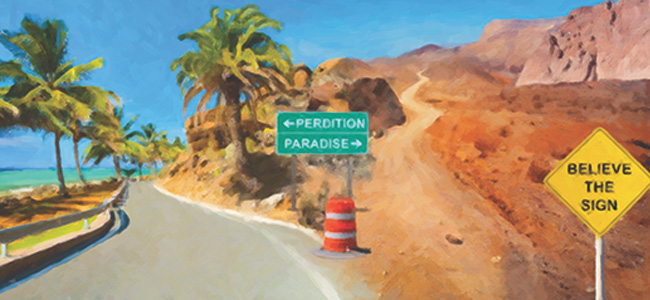The Patience of the Saints

From the very beginning God gave the human race power to choose between right and wrong, obedience and rebellion, life and death. To the first couple, He said: “Of every tree of the garden thou mayest freely eat: but of the tree of the knowledge of good and evil, thou shalt not eat of it: for in the day that thou eatest thereof thou shalt surely die” (Genesis 2:16, 17).
There are some interesting points to be considered in this Scripture:
1. God said that they could eat freely of every tree of the garden. Here is true freedom—found in obedience to God.
2. On the other hand, God did not prevent Adam from eating of the forbidden fruit but revealed to him the consequence of disobedience. One well-known preacher has called freedom of choice a “terrible freedom”—full of consequences. Indeed, we should always think carefully before making a decision, especially when it could potentially involve something contrary to God’s will. It’s vitally important to make wise use of our freedom of choice.
To Cain and Abel was also given freedom to choose between following God’s instruction regarding true worship vs. doing their own will. Abel chose the first, Cain the second. We know very well the consequence of each choice.
Before entering the promised land, Moses conveyed two options to Israel: “I have set before you life and death, blessing and cursing: therefore choose life, that both thou and thy seed may live” (Deuteronomy 30:19). We can choose either life or death, but the Lord strongly advises us to choose life. This is a very intelligent choice.
Just before his death, Joshua invited Israel to renew their vow to obey the Lord. He said to them: “If it seem evil unto you to serve the Lord, choose you this day whom ye will serve; whether the gods which your fathers served that were on the other side of the flood, or the gods of the Amorites, in whose land ye dwell: but as for me and my house, we will serve the Lord” (Joshua 24:15). Joshua made it clear that those gods of Canaan could not keep their land. But Israel was free to choose.
During the great apostasy in the time of king Ahab, Elijah, God’s messenger, put two options before the people: “How long halt ye between two opinions? if the Lord be God, follow him: but if Baal, then follow him” (1 King 18:21).
Before that day, Israel had suffered for three and a half years because they trusted in Baal. What would be the intelligent choice? But they were free to choose Baal and suffer the terrible consequences.
In Matthew 7:13, 14, Christ placed before His hearers two ways, explaining the sure results of either: “Enter ye in at the strait gate: for wide is the gate, and broad is the way, that leadeth to destruction, and many there be which go in thereat: Because strait is the gate, and narrow is the way, which leadeth unto life, and few there be that find it.” Also in this regard, Christ strongly recommends us to enter in at the strait gate. But we are free to choose which way we want to follow: life or death.
During World War I, the Seventh Day Adventist people had to choose between
• Obeying God and suffering oppression and persecution from the country, or
• Obeying the civil authorities and suffering the displeasure of God.
A small remnant, by God’s grace, chose to obey the Ten Commandments of God’s law, and these were disfellowshipped from the church they loved and persecuted by the authorities. This faithful stand resulted in the beginning of the Seventh Day Adventist Reform Movement.
Under the preaching of the third angel’s message, everyone will choose between
• Receiving the sign of God and suffering the persecution of the civil and religious authorities, or
• Receiving the mark of the beast and suffering the seven last plagues. (See Revelation 13, the whole chapter, and 14:9–13).
Which way shall we choose? Only by God’s grace we can choose the right path and be faithful to the Lord.